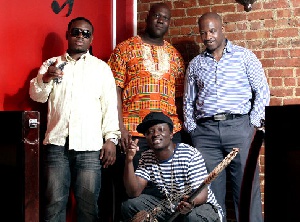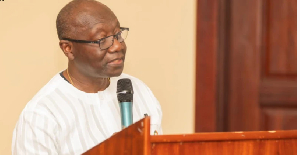The Bronx, birth place of hiphop, is gradually gearing up for the sound of hiplife as some stalwarts of this uptempo sound that echoes Ghana’s jazzy highlife music and American hip hop, continue to break barriers.
Felix Sarpong, a Bronx public school teacher by day and music producer by night, is bullish on hiplife becoming the next American nightclub craze and a source of empowerment for African immigrants. Here are excerpts from a feature he did with New York Daily New:
Since 2003, he has persuaded a small army of young men from a heavily Ghanaian area of the Bronx, nicknamed Little Accra, to trade the dangerous street life for hiplife.
“These kids in the Bronx are talented,” said Sarpong, 36, who was raised in here and in Ghana. “We want to be a voice for the kids.”
A fusion of hip hop and the West African music highlife in both name and in substance, hiplife was born in the 1990s when Reggie Rockstone, a Ghanaian living abroad, began rapping in Twi, his native tongue.
When Rockstone returned to Accra, Ghana’s capital, his songs thrilled African kids gaga for hip hop yet loyal to the mellow tones of highlife and tribal music.
“Ghanaians by nature have a swagger,” said Sarpong, who hunts for talent at import stores on McClellan St., north of Yankee Stadium.
Hiplife matured in Ghana, where the bulk of the music is still produced. But total African immigration to the Bronx has exploded, with 25,000 here in 2000 and 43,000 in 2008, according to census reports known to skew toward the low end.
Because some 20,000 Ghanaians now call the Bronx home, the borough has become a big producer of and market for hiplife.
“The producers are in Ghana, but the artists are here,” said Bronx hip-lifer Kwadena Agyemang, 26.
Ghanaian hiplife legend Kontihene lives in the Bronx and sells tens of thousands of albums here, said Mark Naison, a Fordham University professor who researches Bronx Africans.
Even Bronx Africans from Senegal and Nigeria listen to hiplife, said Fordham student Kojo Ampah, 34.
“Drive on Fordham Road and chances are you’ll hear hiplife playing from a car,” he said.
“When I first heard the music, I was blown away,” said Naison, who expects a hiplife group to follow in the footsteps of Aventura (a Bronx band that blended Dominican bachata and American R&B) and gain global stardom.
“I know that someday the American music industry will discover this gold mine. It’s only a matter of time before hiplife penetrates the mainstream.”
Sarpong puts on shows at tiny Bronx nightclubs, pushes mix-tapes and plans to launch America’s first hiplife radio station.
The goal: to see hiplife and his Bronx protégés succeed.
“It won’t be easy,” said Kwaku Nsoroma, 24, who left Ghana in 2003. “To have a chance, we need to work hard. But that’s why we came to America.”
Read more: http://www.nydailynews.com/ny_local/bronx/2010/06/29/2010-06-29_ghanas_hiplife_music_goldmine.html#ixzz0tVUgNpM2
Entertainment of Monday, 12 July 2010
Source: Ameyaw Debrah













